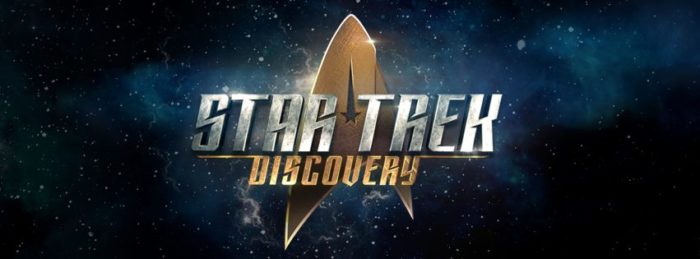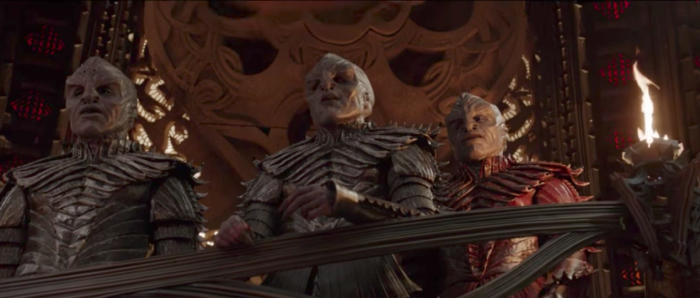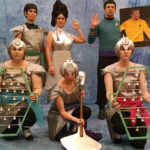Six Things that Work Aboard ‘Star Trek: Discovery’
Star Trek: Discovery not only looks but thinks like an emotional yet plot-driven epic, with equal budget given to both effects and ideas, at least within its first two stories.
For Christian fans, this marks a welcome chance to return to the classic secular humanist worldview of the Trek universe. But so far, the story itself seems to want to lead the way in challenging this worldview. By pitting the still-new and peace-seeking Federation against the Klingons, noble yet aggressive warriors who speak in terms of battle and not peace, the story asks: how should the Federation’s (godless) utopian ideals respond to this challenge?
Despite odds and controversies, both the pilot episode, “The Vulcan Hello” and the second episode, “Battle at the Binary Stars,”1 show that most of this starship’s parts work very well. These include:
1. Respect for what’s come before.
Yes, there are exceptions. (See Klingons, below.) But this series is set in the “prime” universe, the original Star Trek timeline before the recent film series spinoff in an alternate reality. The ships look rougher, more like Enterprise’s prototype(s) than the sleek crafts of The Next Generation and beyond. A greater story purpose (see below also) fits into pivotal Trek history. Plenty of Easter eggs, such as a bottle of Chateau Picard wine, honor past Trek.
2. A reason for the story.
How did the Klingons and Federation end up in the ‘cold war’ lasting through Kirk’s tenure on the Enterprise and ending before The Next Generation era? Star Trek: Discovery begins to answer this, and in a manner very timely to today’s socio-political challenges.

3. Relevant and provocative themes.
I like Star Trek: Voyager and Star Trek: Enterprise. But neither series really offered the timeless human ideas throughout Star Trek: The Next Generation, to say nothing of the single epic woven throughout most of Star Trek: Deep Space Nine. Star Trek: Discovery seems to mark a return to harder-hitting themes.
Sure, the creators overplayed their “we’re woke”-style rhetoric in media interviews. They emphasized the series’ diversity. (Duh, it’s Star Trek, which has always offered ethnically diverse casts—you may as well celebrate it because it has spaceships.) They emphasized the Klingons’ nationalism which is similar to some modern-day nationalists. (Again, Trek has always explored contemporary conflicts, such as the real Cold War and terrorism.)
But the story can speak for itself. At heart of the initial two-parter: should the Federation have shot first? Two Starfleet heroes clash (on the bridge, no less) about this notion. And in the second story’s most poignant moment, a wounded bridge officer begs to know “Why are we fighting?” Indeed: how does an enlightened, peace-loving people respond to sin?
4. Classic humanism.
Star Trek’s heart is classic humanism, the kind espoused by Trek creator Gene Roddenberry and which once existed alongside generic Judeo-Christian values. (It also espoused some nasty idolatry, including but not limited to male chauvinism and mindless fornication.)
The film series made famous by director J.J. Abrams dispensed with this belief system. In the first film, Captain Christopher Pike tells James Kirk that the Federation is “important” but we don’t hear about its beliefs. As a Christian, I appreciate this and yet don’t. Non-belief isn’t always better than principled belief in the wrong idea (even classic humanism). And Star Trek more closely approaches a biblical worldview when its stories explore the good potential of humanity, and yet the evils and ethical compromises that hold us back from it.
In Star Trek: Discovery, this sense of optimistic humanism is back. This isn’t like a more-mystic man-centered religion that suspects we’re a blight on the planet. 2 Here, the newly forged Federation truly seeks peace and cooperation throughout the universe. Its leaders are known for saying, “We come in peace.” But the story is honest enough to show that not everyone instantly aligns with good guys just because they’re good and want peace—and even more surprisingly, it asks us to empathize with these villains.

5. Klingon awesomeness.*
I’m with fans: I don’t like the new Klingons’ appearance as Klingons. They’re not only really, really grotesque—it’s hard to see their eyes and facial expressions—but they’re stiff. I don’t believe these guys could charge into battle. Here, they do a lot of standing around looking at holograms and talking about their religion. They speak only in Klingon, but very slowly.
However. These are great-looking Klingons as an alien race. They’re also ethnically diverse, and this in fact plays into the story as a Klingon revolutionary makes a point of showcasing how his crew accepts even Klingons others would consider racially deviant. Their leader is clearly a religious radical. But this story dares to explore his worldview, right down to the nationalistic parts. If the creators wanted to make them “Trump supporter”-style villains, they’re doing a bad job; at least so far, the story is challenging us to kind of like them.
6. Sweet effects and space battles.
Star Trek: Discovery may be set in Trek’s prime continuity. But its cinematography and effects resemble the big-budget “Kelvin” universe flare, right down to actual lens flare. Warp speed effects have changed (as they did between The Original Series and The Next Generation). Ah, but those sweet, large-scale space battles, not just for effects-porn but for showing the clash between civilizations—those evoke the best scenes of Deep Space Nine.

Bonus thing that worked: Doug Jones as Lt. Saru.
Potential systems failure
Of course, that’s all limited to Star Trek: Discovery’s first two stories. I’m sure more overt, agenda-laden moments are well on their way, including the endorsement of homosexual relationships and beyond. Christian Trek fans will need to deal with those as they come, just as we have with other Trek sex agenda moments, or scantily clad space aliens.
But even those moments will be less potentially tempting, and worth engaging, than Trek’s ongoing themes of Humanity’s Goodness versus Misunderstanding. We’ve always needed to asterisk our Trek fandom. It’s born of an alien religion, which says “mankind is basically good” but cannot, and does not, define this goodness. Trek shows a utopian yet challenging world that exists without God. But such a world can’t fulfill its own promise. It cannot exist in reality, not given our real-life conflicts between even people who truly want peace—and not given the sin-curse in our hearts that only Jesus can cure. But after He does … someday we just may found a real Federation for His glory. I call dibs on the Enterprise-D replica.
- CBS aired the pilot on-air, and the second episode exclusively on its CBS All Access streaming service. Lots of fans have complained about that extra expense. CBS All Access currently costs $5.99 a month with commercials, $9.99 a month without commercials. I think these complaints have little merit, because if you bought the episodes outright on Amazon, each would cost about $2.99. So even if you get CBS All Access only for Star Trek: Discovery, the cost per episode ($10 divided by four per month) is far less. ↩
- Per Scripture including Romans 8, even that “man is a blight on the planet” view is half-true anyway. ↩









































